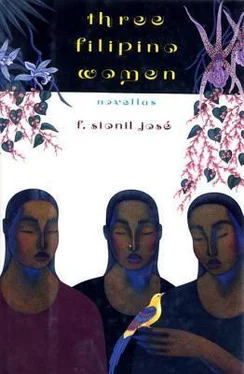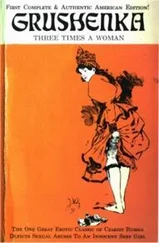Francisco Jose - Three Filipino Women
Здесь есть возможность читать онлайн «Francisco Jose - Three Filipino Women» весь текст электронной книги совершенно бесплатно (целиком полную версию без сокращений). В некоторых случаях можно слушать аудио, скачать через торрент в формате fb2 и присутствует краткое содержание. Год выпуска: 2013, ISBN: 2013, Издательство: Random House Publishing Group, Жанр: Современная проза, на английском языке. Описание произведения, (предисловие) а так же отзывы посетителей доступны на портале библиотеки ЛибКат.
- Название:Three Filipino Women
- Автор:
- Издательство:Random House Publishing Group
- Жанр:
- Год:2013
- ISBN:978-0-307-83028-9
- Рейтинг книги:4 / 5. Голосов: 1
-
Избранное:Добавить в избранное
- Отзывы:
-
Ваша оценка:
- 80
- 1
- 2
- 3
- 4
- 5
Three Filipino Women: краткое содержание, описание и аннотация
Предлагаем к чтению аннотацию, описание, краткое содержание или предисловие (зависит от того, что написал сам автор книги «Three Filipino Women»). Если вы не нашли необходимую информацию о книге — напишите в комментариях, мы постараемся отыскать её.
and
-examine the Philippine experience through the lives of three female characters, a prostitute, a student activist, and a politician.
Three Filipino Women — читать онлайн бесплатно полную книгу (весь текст) целиком
Ниже представлен текст книги, разбитый по страницам. Система сохранения места последней прочитанной страницы, позволяет с удобством читать онлайн бесплатно книгу «Three Filipino Women», без необходимости каждый раз заново искать на чём Вы остановились. Поставьте закладку, и сможете в любой момент перейти на страницу, на которой закончили чтение.
Интервал:
Закладка:
I did not see Narita again for about three years until I started working for my doctorate. For these lapses in the story, I relied on interviews, on remembered bits of conversation, on clippings of that period but mostly on her, for I never hesitated to ask her the frankest questions.
TAPE ONE
Mrs. Cornelia Cruz, cook:
(I have edited out the questions and repetitions so that this transcript is almost verbatim.)
My name is Cornelia Cruz, widow. I am fifty-eight years old and I was born in Bacolod. I have worked for Senator Reyes and his family for forty years, first as maid then as cook. I am a high school graduate and I learned to cook from Mrs. Reyes who also sent me to study at the Cordon Bleu school every afternoon for six months. I can prepare a European-style meal, Chinese, Indian, at least forty dishes — and even an Ilokano pinakbet (vegetable stew) if I were asked to. The Señorita’s favorite was pinakbet , with lots of prawns in it, instead of pork. She also liked half-ripe mangoes with the special sauce I prepare for it. And yes, salted eggs for breakfast, with tomatoes, and fried rice without lard — but with garlic and onions fried before mixing them with the rice. She always liked her meals hot and never cared much for cold cuts, sandwiches, except yogurt. When she went out, and it was possible, she always had a thermos bottle with her for soup, or tea and, of course, she always liked eating at home. She was a good cook herself and that was why I always tried my best. And yes, she knew meats. She could tell whether it was fresh, whether it was the best part of pork or beef. She even told me of the tricks that those women in the market play on their customers.
I was transferred to the new house of Señorito Lopito a week before they moved in. It was empty then — actually empty, and they lived in the Manila Hotel for two months while Señorita furnished it. She was very meticulous and her decorator was very exasperated, but the Señorita knew what she wanted. It was such a beautiful house and the garden — it was much better than the senator’s. But then, from the very beginning, it was not a happy home. They were always quarreling, from the first day they moved into it. Señorita tried, I think, to be a good housewife, seeing to it that the Señorito’s meals were ready when he came home, and she never left home without asking his permission. She never went places — I know because I sometimes accompanied her to Christian’s — her dress shop in Malate, to the supermarket, or to parties with former college friends. And of course, the driver always took her there. Señorito always asked him to report where she went. Me, I had to tell him who called at the house, what she said. He was not the best husband, that I can say. But he never beat her although he could have done it for Señorito easily got violent. All his sports had something to do with violence and death — archery, shooting, fencing. Señorita Narita knew how to handle him, I suppose, for though she seldom raised her voice, from their silences, I knew that there was a lot of quarreling going on. Sometimes late in the night, I would hear them arguing. And, you know, our quarters are separate from the house but still I could hear. But then, when there was a party, it was as if she was the happiest girl in the world. And parties, we had them almost every day. I was never so tired and never before had I worked so hard as when I was in that house; but it was also good for I was able to apply what I learned. The Señorito was meticulous. He ordered the flowers, supervised the seating arrangements. I think he was showing off his wife all the time and he was really proud of her — brilliant, a good singer, a good actress — she was everything a man would be proud to marry or possess. Yes, I think it was that way — the Señorito wanted to possess her as if she were some property which, of course, the Señorita was not. She had a mind of her own and a very good mind, too. Sometimes, when I heard them talking, it was she who had a head on her shoulders. The Señorito would just sit quietly while his wife lectured to him. He really loved her. He bought her clothes and always tried to select materials for them. He bought her jewels, too, lots of them, and whenever they went to Hong Kong, you can be sure they always returned with something very expensive. And paintings, the Señorita introduced them to him, and santos and prints; they bought so many there is one room full of them for there is no place to hang them. And antiques, too — well, you see so many shops now selling them but when they started collecting, there was not a single shop where you could really get them. But Señorita Narita had a way and soon — other collectors were coming to the house, showing her things. She had taste, that is what Lopito always said and he felt very proud because he thought it was he who developed her taste. But that is not true; with her, taste was instinctive.
She was also clever. She convinced her father-in-law — that old, scheming man — to divide his property before he died so that there would be no squabbling among his children. And there were only three of them left, you know, so you can imagine how happy the Señorito was to have money of his own, lots of it. But wait, knowing how much of a spendthrift Lopito was, the Old Man saw to it that he could not spend the money without the approval of his wife or of the Old Man himself. And the Señorita — she was always visiting the senator, bringing him cakes which she baked, calling him up, inquiring about his health. And it was all very sincere so that even after they had separated, she continued seeing him and regarding him as a dutiful daughter should. It was a miracle, really, how the marriage could have lasted five years. Five years! It should not have lasted more than a year but that just shows you how patient she was, how she made herself the martyr which she was and this many people do not know. It was all his fault — that I can assure you. From the very beginning. I once heard Señorita telling him, and these were her exact words—“You are not only a liar, you are a coward. You should have told me, from the start …” To which Lopito screamed, for he was drunk that night, “So you would have gone out and gotten yourself a dozen men.” And the Señorita said, “Not while I am married to you, Lopito. Not while I am your wife. But I will do that the moment I leave this house.” I am not too sure about what he was lying about. Or being a coward for. But you must have noticed, there was something effeminate about him. It really started when the Señorito began bringing those boys to the house. Some of them riffraff, you know. The first time it happened, the Señorita transferred to the second floor guest room. They were sleeping separately in the second year of their marriage and in the third, they were hardly talking; the Señorito still held parties as if nothing had happened. He tried to win her back but it was impossible. Those boys, you know. Then they had this big quarrel, right after a party, for Lopito was flirting with one of the male guests and the Señorita was so embarrassed. That was when she left him — she went to live with her father-in-law. He followed her there and the senator did not know a thing about the boys, you know, and that was when he disowned his son. The Señorita refused to go back to Forbes Park and he really must have missed her, loved her in his own way. Well, you know, he collected guns. It was a shotgun which he used, stuck it into his mouth. It was no accident the way it was made to appear in the newspapers. When he died, the Señorita returned to Forbes Park and redecorated the house, changed everything, sold all the things that belonged to Lopito so that there would be no trace of him: There were less parties — maybe just once a month and I really looked forward to them for by then, I had become a very good cook. Why, I could apply anytime at any of the hotels or first-class restaurants. I have polished my French cooking so much, we had a guest once from Paris and he said he thought it was a French chef who prepared the meal.
Читать дальшеИнтервал:
Закладка:
Похожие книги на «Three Filipino Women»
Представляем Вашему вниманию похожие книги на «Three Filipino Women» списком для выбора. Мы отобрали схожую по названию и смыслу литературу в надежде предоставить читателям больше вариантов отыскать новые, интересные, ещё непрочитанные произведения.
Обсуждение, отзывы о книге «Three Filipino Women» и просто собственные мнения читателей. Оставьте ваши комментарии, напишите, что Вы думаете о произведении, его смысле или главных героях. Укажите что конкретно понравилось, а что нет, и почему Вы так считаете.












